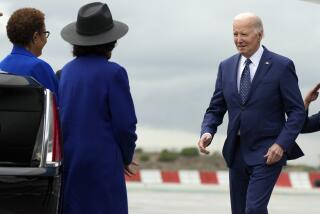Plan Unveiled to Speed Cargo Processing
- Share via
U.S. Customs and Border Protection Commissioner Robert C. Bonner on Tuesday proposed a system of “smart” cargo containers that could deter terrorist attacks and speed the flow of goods into the U.S.
The technology, which is undergoing field tests on vessels using busy shipping lanes between Singapore and Southern California, involves the use of wireless sensors inside cargo containers. The sensors would allow the containers to be monitored for signs of tampering.
Flanked in a Manhattan Beach hotel by business leaders who support the plan, Bonner said the sensors represented “breakthrough technology” that would result in a “phenomenal increase in security” for cargo destined for U.S. markets.
The wirelessly monitored container is the key feature in a stepped-up effort to entice retailers and shipping lines to increase their security from foreign docks where goods are loaded to U.S. destinations at seaports, airports and border crossings.
In exchange for installing the sensors and agreeing to tougher security standards, businesses would move to the front of the line in getting their goods cleared by customs or would avoid inspections completely, Bonner said.
Senior executives from Nissan North America Inc., Toyota Motor Sales U.S.A. Inc., Hasbro Inc. toy company and APL Ltd. shipping line said they supported the voluntary plan because it could speed product shipments while maintaining tight security standards established after the Sept. 11, 2001, terrorist attacks.
In addition, they said, it was feasible and relatively inexpensive, with sensors costing as little as $5 to $10 per container.
The new system could allow companies to get goods to market more quickly, said Leslie K.B. Cazas, senior manager for Nissan North America’s customs and trade administration group.
Container inspections delay shipments by an average of seven days, Cazas said.
“That could shut down an assembly line or result in lost sales,” she said.
Earl Agron, APL’s vice president of security, said the system proposed by Bonner was preferable to one of the alternatives under consideration in Washington: a dramatic increase in the number of inspections.
“It’s not how many containers you inspect, but which containers you inspect,” Agron said.
About 8,200 retailers, freight forwarders, shipping lines and other companies currently participate in a program called Customs-Trade Partnership Against Terrorism, which expedites processing and requires fewer cargo inspections than for those companies that aren’t in the program. The program, begun in November 2001, requires a detailed security plan on how each company is safeguarding its products from foreign ports to U.S. destinations.
Some experts who have studied port security offered guarded support for the smart container idea but pointed out that the task was huge, given the fact that more than 13 million cargo containers moved through the ports of Los Angeles and Long Beach in 2004.
“It’s a step in the right direction,” said Amy Zegart, a professor at UCLA’s School of Public Policy. “Will it work better than current programs? Since the benchmark for those is pretty low, the answer is probably yes.”
But Peter Peyton, secretary for Local 63 of the International Longshore and Warehouse Union, cautioned that technology alone wasn’t a solution.
“Until you know you can trust the person who sealed that container,” Peyton said, “you’re nowhere.”
More to Read
Inside the business of entertainment
The Wide Shot brings you news, analysis and insights on everything from streaming wars to production — and what it all means for the future.
You may occasionally receive promotional content from the Los Angeles Times.











